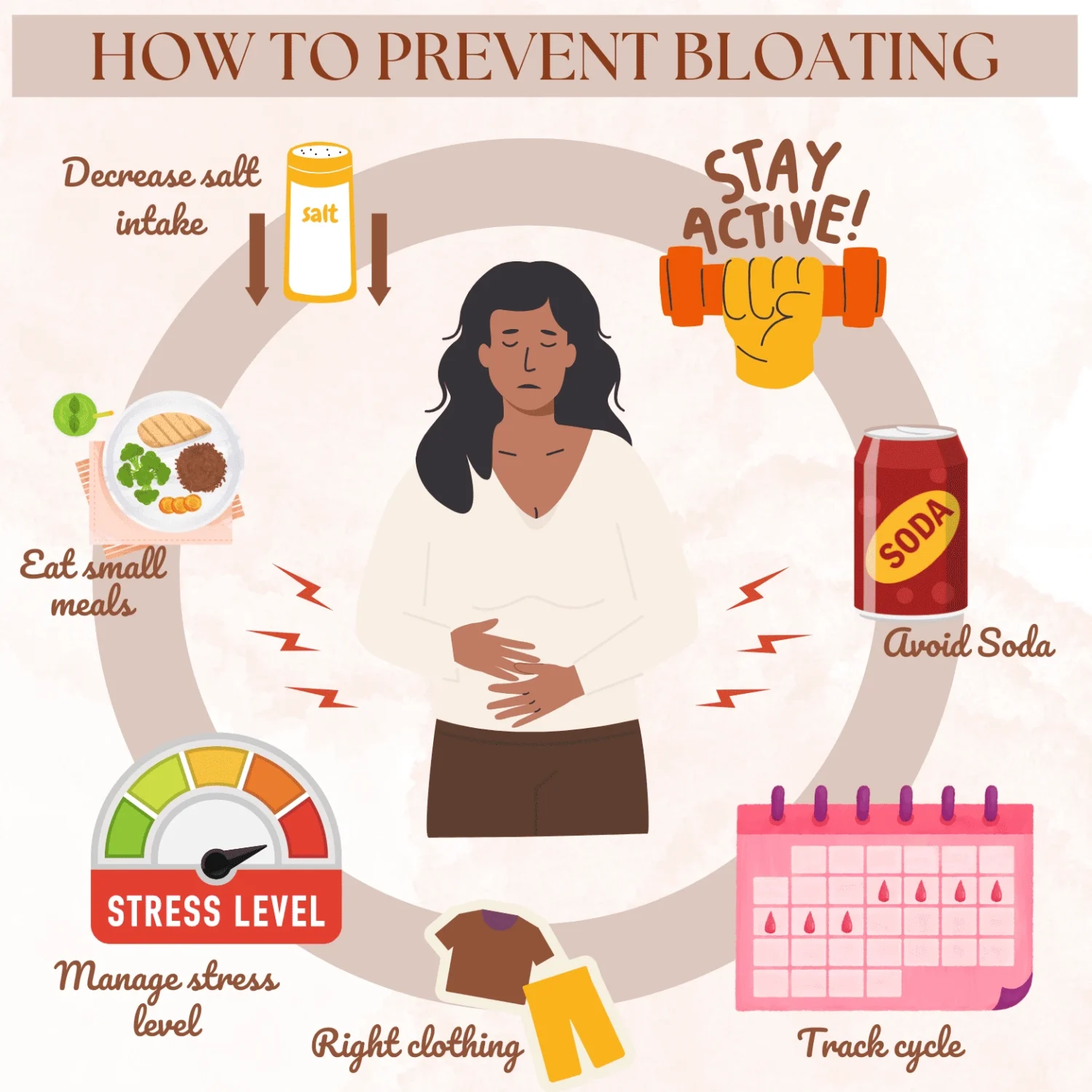
Have you ever noticed your belly feeling swollen and heavy just before or during your period? This is called period bloating, and it’s something many people experience. While it can be uncomfortable, the good news is that you’re not alone, and there are ways to deal with it. In this article, we will talk about what causes period bloating, how to manage it, and how to prevent it from affecting your daily life.
What Is Period Bloating?
Period bloating happens when your belly feels bigger than usual. It’s a common symptom of premenstrual syndrome (PMS) that many people experience a few days before their period starts. For some, the bloating goes away after a day or two, while others may feel bloated throughout their period. This bloating is caused by changes in your body during your menstrual cycle.
The feeling of bloating can also vary. Some people might notice mild puffiness, while others feel so bloated that their clothes feel tight. It’s not just limited to the stomach area either—you might notice bloating in your face, hands, or legs too.
What Causes Period Bloating?
Understanding what’s happening in your body can help you manage bloating better. Here are the main causes:
1. Hormonal Changes
Your hormones fluctuate throughout your menstrual cycle. Just before your period, there is an increase in progesterone and estrogen levels. These hormones can cause your body to retain water and salt, leading to bloating. These hormonal shifts are a natural part of your cycle, but they can feel disruptive when they lead to physical discomfort.
2. Water Retention
Higher hormone levels make your body hold onto water. This can make you feel puffier and heavier, especially in your belly, face, and even your hands and feet. While water retention is temporary, it can still feel uncomfortable.
3. Digestive Changes
Hormones also affect your digestive system. During this time, your intestines may slow down, causing gas and constipation, which can make bloating worse. You might also notice more sensitivity to certain foods, which can add to the discomfort.
4. Diet Choices
Certain foods and drinks can make bloating worse. For example, eating salty foods, drinking fizzy beverages, or consuming too much caffeine can all contribute to that swollen feeling. Foods that are hard to digest, like beans or cruciferous vegetables (such as broccoli and cauliflower), might also play a role.
5. Stress
Stress can affect your hormones and digestion, making bloating feel even worse during your period. When you’re stressed, your body releases cortisol, a hormone that can interfere with your normal hormonal balance and digestion.
6. Underlying Health Conditions
While bloating is usually normal, it can sometimes be linked to health issues like irritable bowel syndrome (IBS), polycystic ovary syndrome (PCOS), or endometriosis. These conditions can make bloating during your period more severe.
Remedies for Period Bloating
If bloating is making you uncomfortable, don’t worry! There are simple remedies that can help.
1. Stay Hydrated
Drinking plenty of water can actually reduce bloating. It helps flush out excess salt and keeps your digestion moving smoothly. Adding a slice of lemon or cucumber to your water can make it more refreshing.
2. Eat a Balanced Diet
Focus on foods that fight bloating:
- Fruits and vegetables like bananas, oranges, cucumbers, and leafy greens are rich in water and potassium, which help reduce water retention. Bananas, in particular, are high in potassium, which balances out sodium levels in your body.
- Whole grains like oats and brown rice can keep your digestion regular and prevent constipation.
- Avoid foods that worsen bloating, such as:
- Salty snacks like chips, which can make your body hold onto water.
- Fried or greasy foods that are harder to digest.
- Sugary treats and fizzy drinks can cause gas and bloating.
You might also try incorporating anti-inflammatory foods, such as ginger, turmeric, or fennel, into your meals to reduce bloating.
3. Exercise Regularly
Light exercises like walking, yoga, or stretching can improve blood circulation and reduce bloating. Physical activity helps your body release excess water and gas. Yoga poses like the “child’s pose” or “happy baby pose” can specifically target abdominal discomfort, read 7 best yoga poses for period pain relief
4. Use Heat Therapy
You can place a warm heating pad or hot water bottle on your belly, which may help relax your muscles and reduce the discomfort caused by bloating. The warmth can also help with any cramps you might be experiencing.
5. Try Herbal Teas
Certain herbal teas, like peppermint, chamomile, or ginger tea, can soothe your stomach and reduce bloating. Peppermint tea helps with digestion, while ginger tea has anti-inflammatory properties that can calm your stomach.
6. Over-the-Counter Medicines
If bloating is severe, you can try medications like anti-bloating pills or diuretics. Some people find relief with over-the-counter remedies like simethicone, which helps reduce gas. However, it’s always best to consult your doctor before taking anything new.
7. Probiotics
Probiotic supplements or foods like yogurt, kefir, and sauerkraut can promote healthy gut bacteria. A balanced gut microbiome can improve digestion and reduce bloating.
Prevention Tips for Period Bloating
While it may not be possible to avoid bloating entirely, these tips can help reduce its intensity:

1. Limit Salt Intake
Avoid salty foods, especially in the week leading up to your period. Too much salt causes your body to retain water, making bloating worse. Check food labels for hidden sodium, especially in processed foods.
2. Stay Active
Regular exercise throughout your menstrual cycle can help keep your hormones balanced and reduce bloating. For the most part, try to have at least 30 minutes of moderate exercise, such as walking, swimming, or cycling, most days of the week.
3. Eat Small, Frequent Meals
Try to eat smaller and frequent meals to avoid feeling full and bloated, as eating large meals can make you feel overly full and bloated. Pair proteins with healthy fats and fiber for sustained energy and better digestion.
4. Avoid Carbonated Drinks
Fizzy drinks can increase gas in your stomach, making bloating worse. Opt for still water or herbal teas instead. If you miss the fizz, try sparkling water without added sugars or artificial sweeteners.
5. Manage Stress
Practicing stress-relief techniques like meditation, deep breathing, or journaling can help keep your hormones in check and reduce bloating. Engaging in a relaxing hobby or spending time outdoors can also lower stress levels.
6. Track Your Cycle
Keeping track of your menstrual cycle can help you identify when you’re most likely to experience bloating. This way, you can take steps to manage it ahead of time. Use a period-tracking app to monitor symptoms and patterns.
7. Choose the Right Clothing
Wearing loose-fitting clothes during your period can help you feel more comfortable. Tight clothes might make bloating feel worse by adding unnecessary pressure to your stomach.
Taking Care of Yourself Matters
Period bloating can be annoying, but it’s a common part of the menstrual cycle. By understanding what causes it and following simple remedies and prevention tips, you can manage it better and feel more comfortable during your period. Everybody is different; therefore, what works may take some time to come about. Remember, whenever something feels wrong, do not hesitate to reach out to a doctor; taking care of yourself is the best thing



